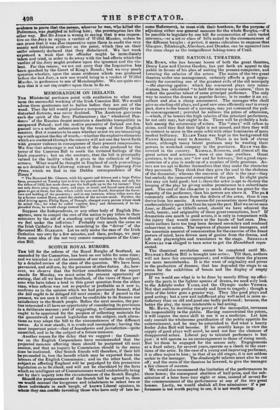THE NATIONAL THEATRES.
MR. BUNN, who has become lessee of both the great theatres, Drury Lane and Covent Garden, has put forth an appeal to the public in favour of his plan of uniting the present companies, and lowering the salaries of the actors. The union of the two great theatres under one management, certainly affords a good oppor- tunity for correcting one of' the greatest evils of the old monopoly —the starring system; which has converted plays into mono- dramas, less calculated " to hold the mirror up to nature," than to reflect the peculiar talent of' some principal performer. The only way to restore the drama to popular favour, is to render it an ex- cellent and also a cheap amusement. : The manager who shall give us sterling old plays, and good new ones efficiently cast in every part, down to the bearer of a message, may yet command the pub- lie encouragement ; provided he reduces the prices of admission, —which, if he lowers the high salaries of the principal performers, he not only may, but ought to do. There will be probably a hub- bub among the aristocracy of actors. The "stars" will refuse to shine, until they find their light is not missed, and then they will be content to move in the same orbit with other luminaries of more modest brilliancy. ELLEN TREE was kept in the background till FANNY KEMBLE went to America. There is no lack of clever actors, although many latent geniuses may be wasting their powers in wretched company in the movinces. KEAN was dis- covered in the country. KEMBLE, SIDDONS, and almost all the great actors and actresses, were at one time strollers. Great geniuses, to be sure, are "few and far between," but a good repre- sentation of a play is made up of a number of little geniuses. Ac- tors are too apt to flatter themselves that they make the character they personate. They think that they give the soul to the skeleton of the dramatist; whereas the converse of this is the case—they but embody the immortal conception of the poet. In slight parts this may not hold good; but ia these the actor is apt to destroy the keeping of the play by giving undue prominence to a subordinate part. The soul of the chatacter is much oftener too great for the capacity of the performer, than his powers are above it. The pat commonly suffers more from the defects of the actor, than it can derive from his merits. A succeseful personation more frequently confers celebrit y upon him than he upon the part. Had we never seen Lear, or Hamlet, or Othello acted, should we have admired the truth, beauty, and originality of those great conceptions, less? If dramatists owe much to good actors, it is only in comparison with the injury they would receive at the hands of bad ones. Dra- matic authors have too long been deemed secondary and rendered subservient to actors. The caprices of players and managers, and the uncertain amount of remuneration for the exercise of the finest powers of mind, have driven men of genius from the drama, and left only playwrights and translators to the stage. SHERIDAN KNOWLES was obliged to turn actor to get the Hunchback repro sented.
-
The theatrical revolution cannot be completed until Mr. BULWER'S Reform Bill is brought into action. Till then, authors will not have fair encouragement; and without them the p!ayers are mere mountebanks. It is the want of originality and power in the production of dramas, that has degraded the stage to an arena for the exhibition of beasts and the display of empty pageantry. If we would see what is to be done by merely filling up effici- ently the parts in the lighter species of drama,-we need only look to the Adelphi under YATES, and the Olympic under VESTRIS. Not that audiences prefer comedy and farce to tragedy ; though a little of the latter goes a greater way. They like good plays and good acting; but a new and indifferent play well acted is more sa- tisfactory than an old and good one badly performed; because, the better the play, the more intolerable is bad acting.
Mr. BUNN, by doubling the power of the monopolist, increases his responsibility to the public. Havino.t' concentrated the poison, it will require the mole skill to use it as a medicine. Let him only consult the wholesome gratification of the public appetite for entertainment, and he may be astonished to find what a hearty feeder John Bull will become. If he steadily keeps in view the supply of good plays well acted, he need not fear the clamour of disappointed actors. Liberal pay to talented performers is but just : it will operate as an encouragement to those of rising merit. But let them be engaged for the season only. Engagements at a fixed salary, for several years, operate as a check to the exer- tions of the actor. In the case of a young and improving performer, it is often unjust to him; in that of an old stager, it is not seldom unfair to the manager. The deadweight salaries must also be cut off; and the rents of the theatres be lowered, to give the manager a fair chance of success.
We would also recommend the limitation of the performances to three hours; the consequent abolition of half-price, and the sub- stitution of a later hour (say eight or nine, instead a seven) for the commencement of the performance at one of the two great houses. Lastly, we would abolish all free admissions' if a per formance is not worth paying to see, it is not worth seeing.
















 Previous page
Previous page